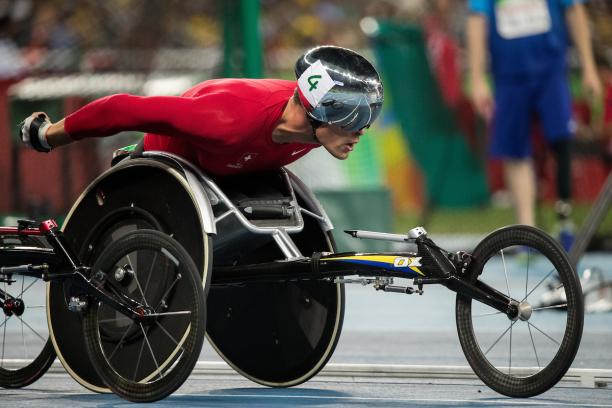Para athletics: Five things we learned at Rio 2016
30.09.2016The Games may be over but here are five thoughts from the Olympic Stadium to keep us entertained during the off-season.
 Marcel Hug SUI leads the Men's 5000m - T54 Round 1 Heat 1 at the Olympic Stadium.
© • Simon Bruty for OIS/IOC
Marcel Hug SUI leads the Men's 5000m - T54 Round 1 Heat 1 at the Olympic Stadium.
© • Simon Bruty for OIS/IOC
The Para athletics action at Rio 2106 brought us everything – elation, heartache, excitement and sometimes, surprise. Here is what we learned over the 11 days of action in Rio de Janeiro, Brazil.
Persistence pays off
Don’t let past experiences get in the way of Paralympic gold - persistence certainly paid off for a number of star Para athletes at Rio 2016.
Swiss racer Marcel Hug has been competing in wheelchair racing for 20 years – Rio 2016 was his fourth Paralympic Games and he finally made it to the top of the podium not once but twice, winning the 800m T54 and marathon T53/54.
Canadian Brent Lakatos, 36, also struck gold at his fourth Games, winning the 100m T53, while Tunisia’s Abbes Saidi held off Australia’s world record holder Deon Kenzie to win the men’s 1,500m T38 – his first individual Paralympic title since starting out at Athens 2004.
There’s a changing of the guard
Brazil’s queen of London 2012 Terezhina Guilhermina , Australia’s five-time Paralympic gold medallist Evan O’Hanlon and Germany’s three-time Paralympic champion Martina Willing were amongst those who achieved great success four years ago – and before that too - but found themselves losing out to a new generation of stars at Rio 2016.
Many youngsters shone in Rio – just look at the women’s 100m T35, which featured four teenagers and was won by 17-year-old Chinese sprinter Xia Zhou. South Africa’s 14-year-old Ntando Mahlangu won 200m T42 silver in Rio – don’t be surprised if he tops the podium sometime soon.
Never underestimate the Chinese
China topped the medals table once again at Rio 2016 – and caused some major upsets too. The USA’s wheelchair racing phenomenon Tatyana McFadden was aiming for seven titles at Rio 2016 but she missed out on gold in the 100m T54 to Wenjun Liu while in the marathon Lihong Zou pipped her on the line. Australia’s double world champion Angie Ballard also missed out on Paralympic gold as Hongzhuan Zou won both the 400m and 800m T53 - her teammate Lisha Hang won the 100m T53.
China was in superb form out in the field too, winning 14 events.
Fitter, faster, further - Para athletes continue to break new ground
A phenomenal 69 world records broken at Rio 2016 – some records had stood for a matter of months, others for over a decade. World records fell across all events – on the track, in the throws, long jump and high jump.
Cuba’s Omara Durand lowered her 100m T12 world record to 11.40, underlining just why she is the world’s fastest female Paralympian; Brazilian Petrucio Ferreira broke the 100m T47 record that had stood for over 20 years, and India’s Devendra added 1.82m on to the javelin F46 world record he last set when he won gold at Athens 2004, throwing 63.97m.
There may have been no world record for Algeria’s Abdellatif Baka who clocked 3:48.29 to win the men’s 1,500m T13 – but it was faster than the time it took to win Olympic gold a month earlier.
A home crowd never lets you down
There’s no denying the passion and fervor of the local Brazilian crowd, who roared their athletes home at every opportunity, be it heats or finals. The men’s high jump T44 and T47 had the crowd on their feet, captivated by the competition long after events finished on the track. The Olympic stadium was a sea of yellow and green and the Cariocas Maravilhosa did their nation proud.





















